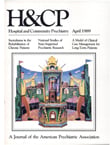Outcomes of Five Years of Continuous Intensive Case Management
Abstract
Five years of intensive case management and specialized alternatives to hospitalization were provided to 72 young recidivistic, treatment-resistant, chronically thougbt-disorderedpatients. Cornpared with a two-year prestudy baseline, patients' days in the hospital during the five years were reduced by 75 percent, but this reduction was offset by a 193 percent increase in structured residential care days in the community. Patients' level of functioning as rated by the Global Assessment Scale and other measures remained essentially the same over the five years. However, use of emergency services and after-hours on-call services decreased steadily throughout the study. Comprehensive cost-analysis revealed that savings in hospital costs were offset by increased costs of community care. The authors conclude that this treatment approach effectively stabilized the treatment-resistant patients in the community but did not reduce net costs in constant dollars.
Access content
To read the fulltext, please use one of the options below to sign in or purchase access.- Personal login
- Institutional Login
- Sign in via OpenAthens
- Register for access
-
Please login/register if you wish to pair your device and check access availability.
Not a subscriber?
PsychiatryOnline subscription options offer access to the DSM-5 library, books, journals, CME, and patient resources. This all-in-one virtual library provides psychiatrists and mental health professionals with key resources for diagnosis, treatment, research, and professional development.
Need more help? PsychiatryOnline Customer Service may be reached by emailing [email protected] or by calling 800-368-5777 (in the U.S.) or 703-907-7322 (outside the U.S.).



